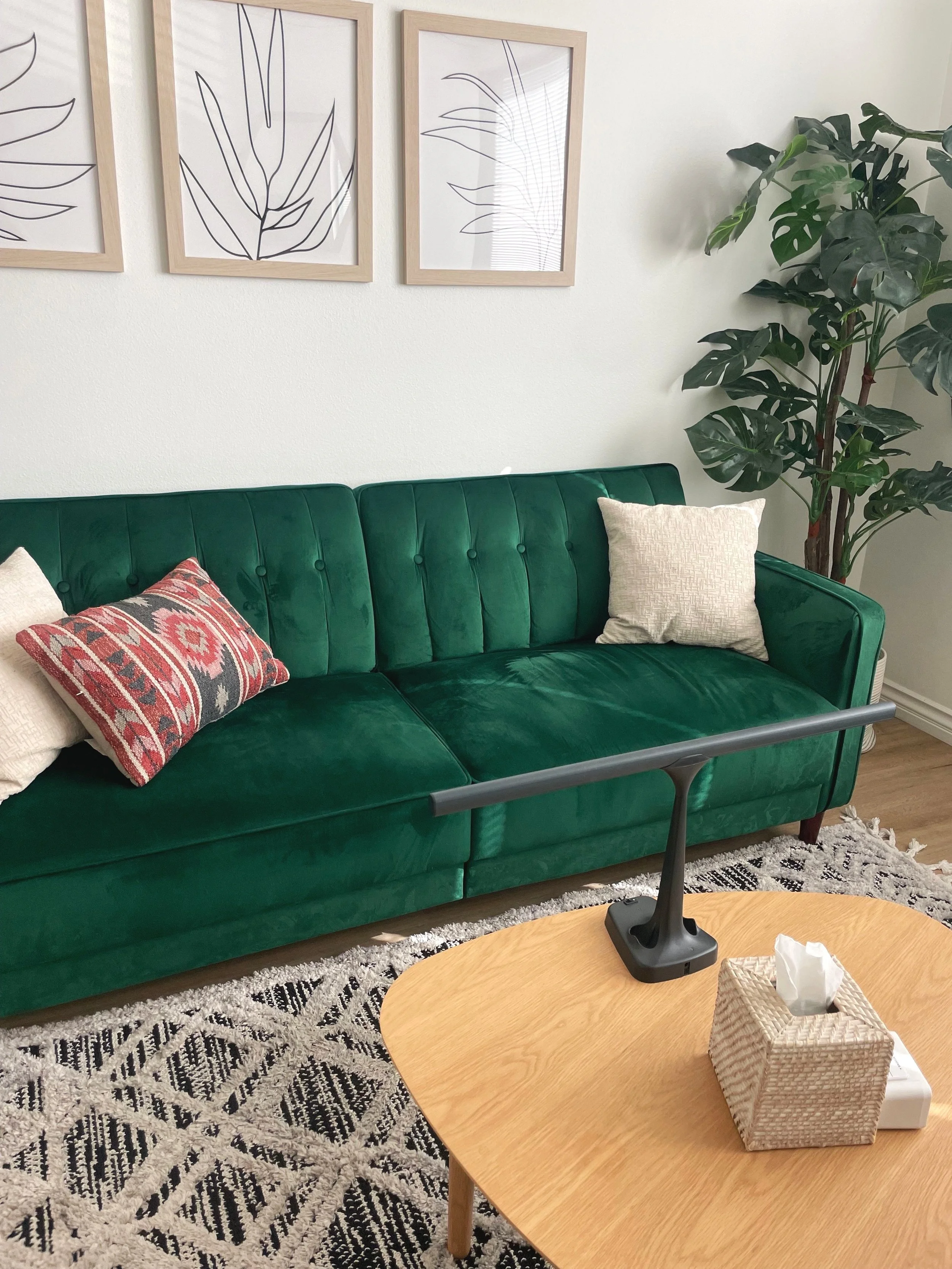6 Holistic Ways to Get Better Sleep
Would you like to sleep better?
If you’re here, my guess is the answer is yes. I don’t blame you! I’m a happier, healthier version of myself when I’m sleeping well and there are a few reasons why. Having difficulties when it comes to sleep, whether that’s trouble falling asleep, staying asleep, or the quality of sleep you’re getting is one of the most common symptoms new clients bring up in the first few sessions.
Difficulty sleeping is a symptom associated with several mental health struggles as well.
“sleep and mental health go hand-in-hand, with many, if not all, mental health problems being associated with problems sleeping. Traditionally, sleep problems have been viewed as a consequence of mental health problems. Although this is not contested, evidence also suggests that problems sleeping can contribute to the formation of new mental health problems and to the maintenance of existing ones. In other words, sleep is now thought to have a bidirectional relationship with mental health, with problems sleeping likely to influence both the onset and trajectory of a variety of mental health difficulties” (Scott et. al, 2017).
So, improving our sleep can benefit our mental health! The quality of our sleep also plays a role in how well our nervous system is functioning. Let’s take stressors for example, if we are sleeping poorly (which is a kind of physical stressor) we will be less able to properly handle stressors and may find that we are overwhelmed more easily.
Let’s explore a few holistic tips + tricks to get better sleep, shall we?
1. Sleep habits
We are creatures of habit. Maybe consider, what are my sleep habits? Creating an intentional wind-down routine, being thoughtful about allowing ourselves to shift out of the hustle of the day and into a state of rest, and removing things that interfere with relaxation can be helpful steps.
Check in with your sleep environment to set your space up to be a relaxing place. Explore what might help you wind down, perhaps taking a bath or shower, doing a skincare routine, or listening to soothing music.
An app that can help you work on sleep habits, set reminders to help you build habits, and track your sleep is CBT-i Coach. This will walk you through the five components of CBT-i; sleep hygiene, cognitive restructuring, relaxation techniques, stimulus control, and sleep consolidation.
2. Thought Dump
If you’ve ever laid down at night and felt tired, but as soon as you’re ready to sleep your mind just starts racing —— this is for you. Leave a journal or notebook by your bed and spend 5-15 minutes as a part of your bedtime routine writing. This is a great transition step to leave your stressors, anxiety, and to-do list behind you and disconnect from the rush of your day.
I often talk with clients about externalizing things, which means taking things within us and bringing them out into the world so that we can see them more clearly and change the way we’re interacting with them. Journaling is a great way to do this. Our thoughts move so quickly that they’re hard to keep up with, let alone re-direct. Writing them down on paper gives us a fighting chance, as well as an opportunity to reflect on what we may be trying to protect ourselves from.
We are hardwired to anticipate danger and so often, the function of our stressors or the cues for our anxiety is trying to anticipate what may happen to us so that we can be prepared for it. The tricky thing is that we just wind up exposing ourselves to all the avenues of stress that may never end up happening.
So, lovelies, dump those thoughts down on paper. Notice that there may be good intentions behind them, i.e.. wanting to protect yourself. And, allow yourself to shift into something else that will more effectively move through whatever life brings you…sleep.
3. Wind down routine - meditation
In thinking about creating a wind-down routine, try to include things that help you relax or that will be regulating to your nervous system. Meditations can be a wonderful transition activity to help us disconnect from the day and drop back down into our bodies.
〰 meditation apps:
I’ve really been loving using O p e n — what I find so handy about this app is that there are morning and nighttime meditations recommended to you daily on the home screen. This streamlines getting into my meditation practice.
Another wonderful resource is Insight Timer. There are so many free meditations in this app and so many options. Perhaps try searching through the sleep section for sleep meditations, bedtime tales, or sleep music.
4. Progressive Muscle Relaxation
One recommendation to add to your list for a wind-down routine would be a progressive muscle relaxation. These guided meditations walk you through tensing and releasing the tension in your muscles from head to toe.
We naturally build tension in our bodies throughout the day and depending on how well our nervous system is functioning, we can be carrying quite a lot of extra tightness + holding.
“Progressive relaxation exercises help to balance the sympathetic nervous system by relaxing the body, lowering blood pressure, stimulating blood circulation, and ensuring muscle relaxation” (Xiao et. al, 2020). This study found benefits to progressive muscle relaxation in helping participants fall asleep and increasing sleep quality.
5. Soothing 〰
Soothing can be broken down into three main types: physical, mental, and emotional.
Physical soothing can look like a warm bath or shower, slow movement, and stretching.
Mental soothing can look like visualizations, listening to music that slows your mind, and using soothing smells (like candles and essential oils).
Emotional soothing can look like talking or being around people that you care about or pets, a gratitude practice, and positive self-talk.
6. Minimize screen-time
We all knew this one was coming. Didn’t we sense this would be on here?
Social media boundaries can be so difficult in an era where platforms are designed to take as much of our time as possible. A playground for racing thoughts ————
In order to have some intentional stillness, allow yourself to disconnect from your phone / computer / tv.
Perhaps swap out these activities with something that helps you get more connected to your body — like stretching. Or something that serves as a distraction and helps you to stay more present — like reading.
I hope these tips are a helpful resource for you, thanks for being here.
—————————————————
References:
Scott, A. J., Webb, T. L., & Rowse, G. (2017). Does improving sleep lead to better mental health? A protocol for a meta-analytic review of randomised controlled trials. BMJ open, 7(9), e016873.
Xiao, X., Lin, J., Lin, Q., Liu, N., Zhong, Q., & Lan, F. (2020). Effects of progressive muscle relaxation training on negative emotions and sleep quality in COVID-19 patients: A clinical observational study. Medicine, 99(47). https://doi.org/10.1097/MD.0000000000023185
About me;
Hi there! I’m Gabrielle, I’m a Licensed Clinical Professional Counselor and Brainspotting Practitioner. I have a passion for working with childhood and complex trauma, helping people learn to be their most authentic selves, and for working with emergency and first responders. Big fan of little moments, thoughtfulness, nature, and anything creative. If you’re interested in working with me, click below to set up a free consultation (:
Pin This Post!
Related Posts
If this post was helpful, you might also like these…











